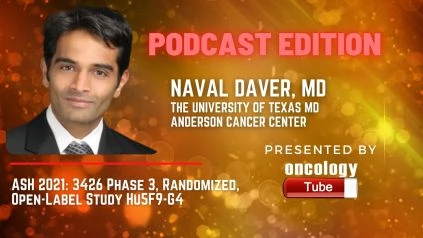Naval Daver, MD from The University of Texas MD Anderson Cancer Center speaks about the ASH 2021 Abstract – 3426 A Phase 3, Randomized, Open-Label Study Evaluating the Safety and Efficacy of Magrolimab in Combination with Azacitidine in Previously Untreated Patients with TP53-Mutant Acute Myeloid Leukemia.
Link to Abstract:
https://ash.confex.com/ash/2021/webprogram/Paper145208.html
Background:
Magrolimab (Hu5F9-G4) is an antibody that kills leukemia stem cells by encouraging tumor phagocytosis by inhibiting CD47, a macrophage immune checkpoint and “don’t eat me” signal on cancer cells. Hypomethylating drugs work along with magrolimab to increase phagocytosis by eliciting “eat me” signals on leukemic blasts. In frontline acute myeloid leukemia (AML) patients who are not candidates for heavy chemotherapy or who have myelodysplastic syndrome, magrolimab plus azacitidine (AZA) has shown promising results. It showed an objective response rate of 69 percent, a complete response rate of 45 percent, and a median overall survival (OS) of 12.9 months in TP53-mutant (TP53m) AML. The TP53 gene mutation is found in 10-15% of newly diagnosed AML patients and is linked to a poor prognosis. Regardless of whether patients are treated with rigorous chemotherapy or non-intensive methods, such as a hypomethylating drug with venetoclax, the documented first-line median OS in TP53m AML is 5-7 months (VEN). Patients with AML who have a TP53 gene mutation have a huge unmet medical need.
Aims: To compare the effectiveness, safety, and tolerability of magrolimab+AZA versus VEN+AZA or “7+3” chemotherapy as prescribed by the physician in patients with previously untreated TP53m AML.
Watch and Share The Video Here: https://oncologytube.com/v/40527
Read and Share the Article Here: https://oncologytube.com/v/41385
Methods and Design:
This is a multicenter, phase 3 randomized, open-label trial. Based on patient fitness, approximately 346 patients will be randomized (1:1) to magrolimab+AZA (investigational arm) or physician’s choice of VEN+AZA or 7+3 chemotherapy (NCT04778397). Randomization will be stratified by age (75 vs 75 years), geographic region (US vs non-US sites), and appropriateness for non-intensive vs intensive therapy. Patients must be at least 18 years old, have histologically proven AML, and have at least one TP53 gene mutation that is not benign or likely benign (confirmed by central laboratory), or biallelic 17p deletions (based on a locally reviewed karyotype/fluorescence in situ hybridization report). Patients assigned to magrolimab+AZA will be given magrolimab intravenously (IV) at a priming dose of 1 mg/kg on Days 1 and 4, 15 mg/kg on Day 8, and 30 mg/kg on Days 11, 15, and 22 during the first 28-day cycle. After that, magrolimab 30 mg/kg will be given weekly during cycle 2 and every other week from cycle 3 onward. VEN and AZA will be given to patients in the VEN+AZA arm according to the labeled indications. Patients receiving 7+3 chemotherapy will have 1-2 induction cycles with IV daunorubicin or idarubicin on Days 1-3 and cytarabine 100 mg/m2 or 200 mg/m2 on Days 1-7, followed by up to four consolidation cycles with high-dose cytarabine (3,000 mg/m2) on Days 1-7. Patients who receive magrolimab+AZA or VEN+AZA will be treated until disease progression, relapse, clinical benefit loss, intolerable toxicities, or stem cell transplant. Patients may receive stem cell transplants if the investigator so chooses. The primary aim is OS in patients who are candidates for non-intensive therapy, with OS in all patients as a crucial secondary endpoint.
Status:
Patients will be enrolled in about 140 clinics around the world. Accumulation is still going on.

